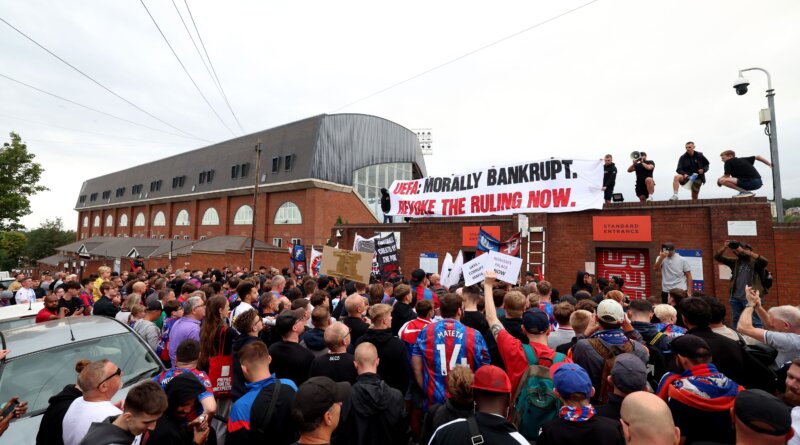# Crystal Palace Europa League Dream Shattered: Fans Protest “Morally Bankrupt” UEFA Decision
The **Crystal Palace Europa League** dream, earned through a historic and hard-fought FA Cup triumph, has been abruptly shattered by a contentious UEFA ruling, sparking widespread fury among the Selhurst Park faithful. In a decision that has been labelled “morally bankrupt” by supporters, the club has been forcibly demoted from their earned Europa League spot to the lesser UEFA Europa Conference League. The ruling stems from UEFA’s strict multi-club ownership regulations, creating a direct conflict of interest with French club Olympique Lyonnais, who are also part of John Textor’s Eagle Football Holdings network.
## The Conflict: Why the **Crystal Palace Europa League** Spot Was Revoked
The core of the issue lies in UEFA’s regulations designed to protect the integrity of its competitions. Article 5 of the UEFA rulebook explicitly prohibits any single entity or individual from having “control or decisive influence” over more than one club participating in UEFA club competitions. This rule is in place to prevent any possibility of match-fixing or owners prioritising one club over another in a potential head-to-head clash.
John Textor’s Eagle Football Holdings is the majority shareholder of both Crystal Palace and French side Lyon. Following a dramatic season, both clubs secured qualification for European football. Palace’s glorious FA Cup victory guaranteed them a spot in the Europa League group stage. Meanwhile, Lyon also secured a place in the same competition through their performance in Ligue 1.
Under UEFA’s framework, when two clubs from the same ownership group qualify for the same competition, only one is permitted to enter. The club that finished in a higher league position in their respective domestic championship gets priority. In this instance, Lyon’s final standing in Ligue 1 trumped Palace’s FA Cup win (as a cup win is not assigned a league position), resulting in the French side retaining their Europa League place and Palace being handed the devastating demotion. This decision has been detailed by numerous outlets, with UEFA’s strict regulations on the matter coming under intense scrutiny from fans who feel their on-pitch success has been nullified by a boardroom technicality.
### Fan Fury Erupts in South London
The reaction from the Crystal Palace fanbase has been one of pure outrage and disbelief. For a club that has battled tirelessly to earn a rare piece of major silverware and the European adventure that comes with it, the news feels like a profound betrayal. Banners have appeared outside Selhurst Park and the club’s training ground, with slogans targeting both UEFA and the ownership structure.
The sentiment is that the players and manager, who achieved sporting merit on the pitch, are being punished for decisions made far above their heads. The demotion carries significant consequences:
* **Financial Impact:** The prize money, broadcast revenue, and gate receipts from the Europa League are substantially higher than those of the Conference League. This ruling directly impacts the club’s budget for the upcoming season.
* **Prestige and Player Attraction:** Competing in the Europa League is a major draw for attracting and retaining top-tier talent. Being relegated to Europe’s third-tier competition diminishes the club’s standing and appeal.
* **The Fan Experience:** Supporters who had dreamed of marquee European nights against some of the continent’s famous clubs now face a different calibre of opposition, robbing them of the full reward for their FA Cup success.
### The Bigger Picture: Multi-Club Ownership Under the Microscope
The **Crystal Palace Europa League** controversy is not an isolated incident but rather the highest-profile example of a growing and complex issue within modern football. The multi-club ownership (MCO) model, popularised by groups like City Football Group (Manchester City, Girona FC) and Red Bull (RB Leipzig, Red Bull Salzburg), is becoming increasingly common.
While owners argue that MCOs create synergies, improve scouting networks, and provide financial stability, critics point to the exact conflict of interest that has befallen Crystal Palace. It raises fundamental questions about sporting integrity, competitive balance, and the very identity of football clubs. Are they community assets competing for glory, or are they simply cogs in a larger corporate machine?
UEFA is now under immense pressure to review and clarify its rules as these ownership models proliferate. The current regulations, while well-intentioned, have created a scenario where a team’s success is ultimately conditional on the performance of a “sister club” in another country—a situation that fans and pundits alike find untenable. As the lines between clubs continue to blur, the sport’s governing bodies face a critical challenge in maintaining a fair and transparent competitive landscape. For now, Crystal Palace and its supporters are the unfortunate victims of a system struggling to keep pace with the game’s rapid commercialisation. Find out more about this and other breaking stories `for more news`.
Your global gateway to nonstop football coverage:
News Goal
Share this content:
